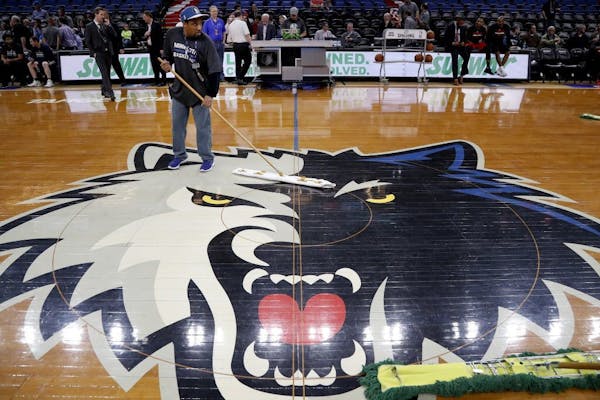If you're one of many Timberwolves fans who miss young Zach LaVine's high-wire act, you're not alone.
Teammate Gorgui Dieng does, too.
LaVine's absence has changed Dieng's own game, modifying when and where he gets the ball and altering the amount of space in which he plays.
Dieng had made 56.7 percent of his shots in the 25 games before LaVine's injury. But in his past 16 games, Dieng has shot 40.8 percent (51-for-125). He played without LaVine in 12 of those games after the two-time NBA slam-dunk champion and the Wolves' best three-point threat's season ended because of a torn ACL.
"It has been tough for me," Dieng said. "A lot of stuff I get usually comes from him, you know?"
It's clear Dieng misses the familiarity of the two-man game they often played together and how LaVine's ability to stretch the floor with his three-point shooting and to attack the rim, created room in which Dieng could work.
"Honestly, I've been struggling without him on the court because I know a lot of stuff when I pop [off a screen] or a when I roll," Dieng said. "He knows when to hit me, where to give me the ball."
Dieng also misses the comfort of a player and a personality with whom he has played since his second NBA season, back when Flip Saunders was the coach and president of basketball operations.
"Both of us were on the bench, we started when Flip was here," Dieng said. "We get to know each other. That's how that two-man game starts, with me and Zach. He was on the bench and wanted to play. I was, too. When we got in, I tried to get him the ball and he'd try to hit me."
Make no mistake, the Wolves have adapted with LaVine out for the season. Going 6-6 since LaVine was hurt in a Feb. 3 game at Detroit, they've streamlined their offense through two young stars — Andrew Wiggins and Karl-Anthony Towns — instead of three, for now.
They have found success doing so. Wiggins' franchise-best streak of 19 consecutive 20-point games ended with Saturday's overtime loss to San Antonio and Kawhi Leonard, two-time NBA Defensive Player of the Year. Towns' streak of the same reached 17 games that night.
Still, that road loss significantly damaged the Wolves' chances to catch Denver for the West's final playoff spot. They'd won four of five games and five of their past seven before Saturday's 97-90 loss when the Spurs never led until 2 minutes, 45 seconds remained in regulation.
Idle since then because unsafe court conditions postponed Monday's home game against Portland, they play the Los Angeles Clippers on Wednesday at Target Center.
"Everyone is playing well right now, and we're winning games," Dieng said. "That's the important thing."
Meanwhile, Dieng plays on, trying to find the chemistry with other teammates that seemed to come so naturally with LaVine when they were starters together and when they both played on a second unit that recently has featured the backcourt combination of point guards Kris Dunn and Tyus Jones.
Dieng and LaVine's partnership during their three seasons together helped Dieng last fall reach a four-year contract extension worth nearly $63 million starting next season.
"They're very good, they had very good chemistry together," Wolves coach Tom Thibodeau said. "I think he's getting to some of that other stuff now with the other guys. Some of the second unit's strengths have changed. With two point guards, it's a little different. Zach was an important part of that second group and when Zach really got in his rhythm, oftentimes it was with 'G.' "
Dieng has worked to find that kind of synergy with Towns, Wiggins and others.
"I'm trying, I'm trying," Dieng said. "We've got different players: Wigs is an iso [isolation] player. KAT plays more in the post. I don't think we have anybody similar like Zach."
Often in Dieng's place, reserve power forward Nemanja Bjelica has found a bigger role, particularly late in games, because of his three-point shooting and improved defense.
But Thibodeau said he wants Dieng to keep doing what he has always done — what Thibodeau calls the "little things" — whether LaVine is beside him or not.
"The game tells you the shots you get and what he has to do for our team," Thibodeau said. "A lot of the things 'G' does, he probably doesn't get enough credit for: his screening, his rolling to the rim, putting pressure on the rim, playing on the baseline, playing behind the basket, playing defense, communicating on defense, making hustle plays. Those things are critical to winning and you can't overlook their importance.
"So he has had a critical role all year."
Not every WNBA draft pick will make her team's roster. Here's why
![Twins fans cheer during their home opener against the Cleveland Guardians Thursday, April 4, 2024 at Target Field in Minneapolis. ] ANTHONY SOUFFLE �](https://arc.stimg.co/startribunemedia/OMOUFG3HLJENJIHGWSEYC5TUXY.jpg?h=91&w=145&fit=crop&bg=999&crop=faces)
